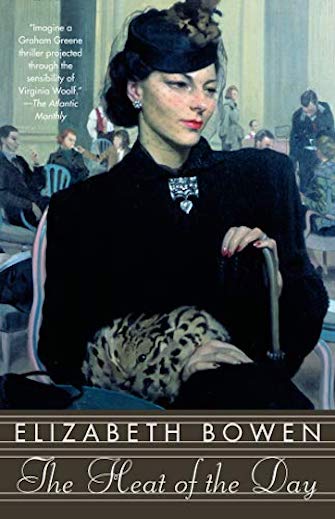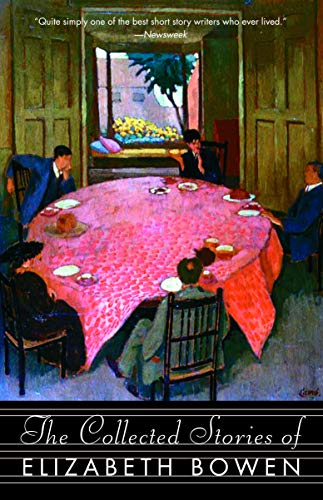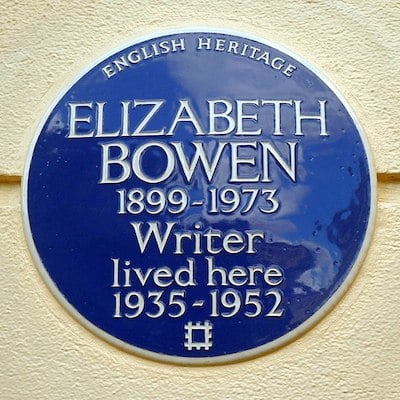Elizabeth Bowen, Irish-British Author of Novels & Short Stories
By Skyler Gomez | On March 24, 2020 | Updated March 25, 2024 | Comments (0)

Elizabeth Bowen (June 7, 1899 – February 22, 1973) was an Irish-British novelist and short story writer best known for fictional works that focused on life in wartime London and relationships among the upper-middle class.
Some have referred to her as the “grande dame” of the modern novel, her work characterized by a conscious, concise style.
Bowen’s work reflects her great interest in “life with the lid on and what happens when the lid comes off.” It examines the innocence of orderly life and irrepressible forces that transforms one’s experience. In her stories and novels, she examines the betrayal and secrets beneath the veneer of respectability.
Early life and education
Elizabeth Dorothea Cole Bowen was born at 15 Herbert Place in Dublin to Florence Bowen and Henry Charles Cole Bowen. She was baptized in the nearby St. Stephen’s Church on Upper Mount Street and spent summers as a young girl at Bowen’s Court, a historic country house near Kildorrery, County Cork.
She lived in Ireland until the age of seven. When her father’s mental illness became acute in 1907, she and her mother relocated to Hythe in England.
After her mother passed away in 1912, Bowen’s aunts became her guardians. They sent her to Downe House School, a selective girl’s boarding school, to receive an education. After attending art school in London, she decided to focus her attention on writing.
Bowen became associated with the Bloomsbury Group. She developed a good friendship with English writer Rose Macaulay, who assisted her in finding a publisher for her first book, Encounters (1923), a collection of short stories.
Love and literature
The same year that Bowen published Encounters (1923) she married Alan Cameron, an educational administrator. Their marriage was never consummated and was described as a “sexless but contented union.”
Although she was with Cameron, she had numerous relationships outside of her marriage. She was in a relationship with Charles Ritchie, a Canadian diplomat seven years her junior, for over thirty years. In addition, she had an affair with Irish writer Seán Ó Faoláin and American poet May Sarton.
Bowen and Cameron lived near Oxford where she regularly socialized with English scholar Maurice Bowra, Scottish novelist John Buchan, and British writer Susan Buchan.
The Last September (1929), one of her most notable works, discussed life in Danielstown, Cork at the time of the Irish War of Independence.
After the publication To the North (1932) was her next novel, Bowen and her husband moved to the Regent’s Park section of London. Here, she wrote The House in Paris (1935) and The Death of the Heart (1938). Between publishing these works, she became a member of the Irish Academy of Letters.
Dealing with success
In 1930, Bowen inherited Bowen’s Court, becoming the first and only woman to do so. In the 1930s and onwards, Bowen had numerous notable visitors come to her home, including Virginia Woolf, Iris Murdoch, and Eudora Welty. On the eve of World War II, she began working for the British Ministry of Information in 1939 and reported on issues of neutrality and Irish opinion.
Bowen’s political views leaned towards Burkean conservatism during the wartime. During and after the war, Bowen arguably wrote one of the greatest expressions of what life was like in wartime London with novels such as The Demon Lover and Other Stories (1945).
For her contribution to literature, she was awarded the CBE (The Most Excellent Order of the British Empire) in 1948.
In 1952, her husband retired and the couple settled in Bowen’s Court. He passed away a just a few months later. After his death, Bowen found it difficult to keep up with her household as she was constantly traveling to the United States to earn money by lecturing.
In 1958, Bowen traveled to Italy to research and prepare for her 1960 novel, A Time in Rome. A year later, she was forced to sell Bowen’s Court. After she sold her beloved home, it was demolished. Bowen spent the next few years without a stable home before she settled in Carbery, Church Hill, Hythe, in 1965.
. . . . . . . . . .

. . . . . . . . . .
Themes in Bowen’s work
Bowen explained that she preferred to write in the mornings when she was “cold, energetic, candid, and rational” as opposed to the evenings when her brain worked “fast but feverishly and with poorer quality.”
When she was working on a novel, she kept “office hours” strictly to standard business hours. She was slow and deliberate in her writing, and as a result, her novels were on the shorter side.
She highly admired the medium of film, and was influenced by filmmaking techniques that were popular in her time. Her most famous novel, The Heat of the Day (1948), is considered the best representation of London during the bombing raids of World War II.
In addition to her highly respected works on the realities of life, Bowen is also noted for her ghost stories. Robert Aickman, a supernatural fiction writer, describes Elizabeth Bowen as “the most distinguished living practitioner” of ghost stories.
. . . . . . . . . .

. . . . . . . . . .
Awards and honors; legacy of Elizabeth Bowen
Elizabeth Bowen was awarded the James Tait Black Memorial Prize for her final novel, Eva Trout, or Changing Scenes (1968). In 1970, she was shortlisted for the Booker Prize for her work on Eva Trout (1968), her final novel about a young woman raised by her millionaire father.
In 1977, the first biography of Elizabeth Bowen was published by Victoria Glendinning. In 2009, Glendinning published a book focusing on the relationship between Charles Ritchie and Bowen based on letters and diaries.
In 2012, English Heritage marked Bowen’s Regent’s Park home at Clarence Terrace with a blue plaque. The plaque was unveiled on October 19, 2014 in commemoration of her residence at the Coach House, The Croft, Headington from 1925-1935.
Four of Bowen’s novels were adapted for British television of films: The Last September, The Death of the Heart, The Heat of the Day, and The House in Paris.
In a 2005 review of Elizabeth Bowen: The Enforced Return by Neil Corcoran, Stacey D’Erasmo summed up this writer’s legacy, noting that she was often compared to Virginia Wolfe and Henry James:
“Elizabeth Bowen is a great writer. To this sentence is usually appended a phrase like: ‘though widely underappreciated’ or ‘though not much read’ or ‘of the Anglo-Irish experience between the wars.’ These are the sorts of phrases that give the impression that Bowen must be read through a special instrument, such as a telescope.
In fact, the opposite is true. Bowen, the author of some twenty-eight books, who lived from 1899 to 1973, had a genius for conveying the reader straight into the most powerful and complex regions of the heart.
On that terrain, she was bold, empathic and merciless. She wrote about the aftermath of wars, about affairs and about childhood with equally piercing insight and a thorough comprehension of the consequences of politics and desire.”
. . . . . . . . . .

English Heritage
. . . . . . . . . .
Final years
In 1972, Bowen spent Christmas with her friends in Kinsale, County Cork. Soon after returning home, she was hospitalized. She had developed lung cancer, and passed away in University College Hospital on February 22, 1973 at the age of seventy-three.
Elizabeth Bowen was buried alongside her husband in Farahy, County Cork churchyard, near Bowen’s Court’s gates. A commemoration of her life is celebrated annually at the entrance to St. Colman’s Church.
More about Elizabeth Bowen
Major works (short stories)
- Encounters (1923)
- Ann Lee’s and Other Stories (1926)
- Joining Charles and Other Stories (1929)
- The Cat Jumps and Other Stories (1934)
- Look At All Those Roses (1941)
- The Demon Lover and Other Stories (1945)
- Ivy Gripped the Steps and Other Stories (1946)
- Stories by Elizabeth Bowen (1959)
- A Day in the Dark and Other Stories (1965)
- The Good Tiger (1965)
- Elizabeth Bowen’s Irish Stories (1978)
- The Collected Stories of Elizabeth Bowen (1980)
Novels
- The Hotel (1927)
- The Last September (1929)
- Friends and Relations (1931)
- To the North (1932)
- The House in Paris (1935)
- The Death of the Heart (1938)
- The Heat of the Day (1949)
- A World of Love (1955)
- The Little Girls (1964)
- Eva Trout (1968)
Biographies and critical studies
- Elizabeth Bowen: A Biography by Victoria Glendinning (2006)
- Love’s Civil War: Elizabeth Bowen and Charles Ritchie – Letters and Diaries 1941-1973, ed. by Victoria Glendinning with Judith Robertson (2009)
- Elizabeth Bowen: A Literary Life by Patricia Laurence (2019)
In addition, there are numerous critical studies and critical essays on Bowen’s works.
More information and sources
- Britannica
- Oxford Bibliographies
- Encyclopedia
- Reader discussion of Bowen’s works on Goodreads
- Collected Stories by Elizabeth Bowen — Ghosts, Comedy, and a Touch of Spark
- Elizabeth Bowen archive at the Harry Ransome Center
Skyler Isabella Gomez is a 2019 SUNY New Paltz graduate with a degree in Public Relations and a minor in Black Studies. Her passions include connecting more with her Latin roots by researching and writing about legendary Latina authors.
Leave a Reply